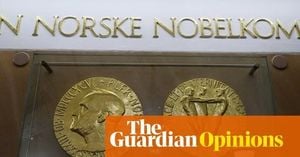The world of global shipping has been rocked by the stalling of what would have been the largest ports deal ever attempted—a $23 billion transaction involving CK Hutchison Holdings Ltd., BlackRock Inc., and Mediterranean Shipping Company (MSC). The Hong Kong-based conglomerate, founded by billionaire Li Ka-shing, confirmed on August 18, 2025, that the sale of its 43 global terminals, including two crucial outposts in the Panama Canal, would not be completed this year. This delay, attributed to mounting regulatory scrutiny and political hurdles, has placed the deal squarely at the intersection of international business and geopolitics.
At first glance, the deal seemed poised to reshape the global logistics landscape. CK Hutchison’s vast network of 43 ports spans key regions—mainland China, Asia, the Middle East, Mexico, and Europe—making it a linchpin in global trade. According to Bloomberg, the sale could have netted the company more than $19 billion in cash, a windfall that would have reverberated through the industry. Yet, as CK Hutchison co-managing director Frank Sixt explained in an analysts’ briefing, the sheer complexity of the transaction has proven formidable. “We are in a new stage of our deal and that includes, as we have said, discussions with a major strategic Chinese investor,” Sixt said. “I believe that there is a reasonable chance that those discussions will lead to a deal that is good for all of the parties, ourselves included, and most importantly, that will be capable of being approved by all of the relevant authorities.”
The sale’s collapse—at least for 2025—has become a symbol of the increasingly tense rivalry between the United States and China. While President Donald Trump has publicly hailed the potential sale as a victory for American interests in the Panama Canal, Beijing has not been shy about expressing its displeasure. According to Bloomberg, Chinese officials view the transaction as a betrayal, seeing CK Hutchison’s willingness to engage with U.S.-backed BlackRock and MSC as a concession to American pressure. This has led to a geopolitically charged environment, where every move is scrutinized not just for its business merits but for its broader implications on global power dynamics.
Adding another layer of complexity, CK Hutchison has invited a major Chinese investor—specifically the state-owned China Cosco Shipping Corp.—into the negotiations. People familiar with the matter say Cosco was negotiating a powerful role for itself as a condition to join the buying consortium, which also includes Italian billionaire Gianluigi Aponte’s Terminal Investment Ltd. The hope, as Sixt indicated, is that bringing a heavyweight Chinese partner into the fold could help smooth the path to regulatory approval and assuage Beijing’s concerns. Yet, so far, these discussions have taken longer than anticipated, and the group’s window for exclusive talks expired in late July without a definitive agreement.
Despite the uncertainty, CK Hutchison remains optimistic about the long-term prospects of the deal. Sixt emphasized that even though the talks have dragged on, the company does not see the delay as particularly troublesome. In fact, the ports and related services business has performed well this year, reporting a 9% increase in revenue and a 10% rise in earnings before interest, taxes, depreciation, and amortization for the first half of 2025. This growth, driven by higher throughput and storage income across several key regions, has provided a cushion against the turbulence of the stalled sale. CK Hutchison shares have reflected this resilience, adding 25% through August 14, 2025, despite a dramatic 92% plunge in profit caused by a one-time, non-cash loss from a merger earlier in the year.
The Panama Canal, already a strategic flashpoint in global trade, has emerged as the focal point of these negotiations. With two of CK Hutchison’s terminals located at this vital chokepoint, control over these assets carries enormous significance—not just for the companies involved, but for governments and militaries around the world. President Trump’s vocal support for the sale underscores its importance to U.S. interests, while Beijing’s strong opposition highlights the canal’s role as a symbol of China’s global ambitions. The deal, as Bloomberg notes, has become a proxy battle in the broader contest for influence over one of the world’s most important maritime corridors.
For CK Hutchison, the path forward remains uncertain. The company has already missed a key opportunity to sign a definitive agreement before its window for exclusive talks expired, and regulatory scrutiny shows no signs of easing. Yet, as Sixt pointed out, the inclusion of a major Chinese partner like Cosco could ultimately pave the way for a deal that satisfies all parties. Whether that will be enough to overcome the entrenched geopolitical obstacles, however, is anyone’s guess.
The stakes are high for all involved. For BlackRock and MSC, acquiring CK Hutchison’s global port network would represent a transformative expansion, potentially positioning them as dominant players in the world of shipping and logistics. For China Cosco Shipping Corp., a seat at the table is not just a business opportunity, but a matter of national pride and strategic interest. And for CK Hutchison, the sale offers a chance to unlock billions in cash, streamline its operations, and focus on new opportunities.
Yet, as the events of the past few months have shown, even the most carefully negotiated deals can be upended by forces beyond the boardroom. The rivalry between the U.S. and China, the strategic importance of the Panama Canal, and the shifting sands of global politics have all combined to create a perfect storm of uncertainty. As Sixt summed up, “I believe that there is a reasonable chance that those discussions will lead to a deal that is good for all of the parties, ourselves included, and most importantly, that will be capable of being approved by all of the relevant authorities.”
For now, the world’s largest planned ports deal remains in limbo, a stark reminder of how commerce and politics are more intertwined than ever. As the months ahead unfold, all eyes will be on CK Hutchison, BlackRock, MSC, and their Chinese counterparts to see whether they can navigate the treacherous waters of geopolitics and bring this historic transaction to fruition. The outcome could reshape not only the shipping industry, but the very balance of power in global trade.



